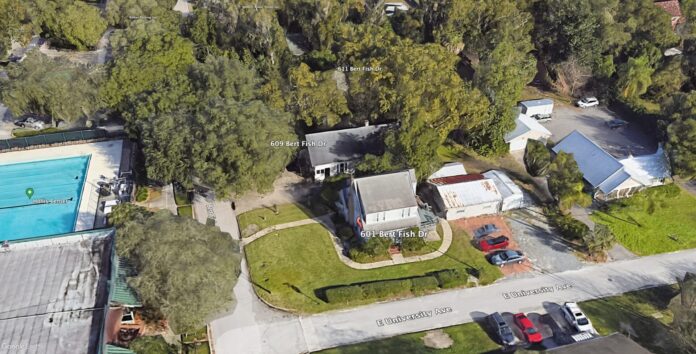
GONE — This photo from Google Earth shows 601, 609 and 611 Bert Fish Drive, three houses that have since been demolished by Stetson University, with permission from the City of DeLand. (The house at 611 Bert Fish Drive is obscured by tree cover in this photo.) At left in the photo is the university’s swimming pool and Hollis Center. Using the removal of these houses as an example, our Opinions writer proposes that the City of DeLand is not devoting the necessary resources to accomplish historic preservation, and urges readers to get involved in the process of budget-making.
Editor, The Beacon:
In her editorial in the Jan. 12-18, Beacon, Barb Shepherd asked, “How committed are we to preserving history?” My answer is “Not very committed at all.”
As an observer of the historic-preservation process in DeLand, it seems like the city officials and the community are playing a game of “make believe.” Mark Shuttleworth, in his guest commentary in the Jan. 12-18 edition, stated that it was time for the City of DeLand to exercise its authority to prevent what he sees as “demolition by neglect” by historic property owners who defer any maintenance and then argue that the rehabilitation of the property is too costly, and therefore seek a demolition permit.
There are so many examples of the city allowing the demolition of “old buildings,” but the recent approval of a demolition permit by the City Commission over the recommended denial by the Historic Preservation Board — of three single-family homes by Stetson University — is most egregious.
The Historic Preservation Board, at its November meeting, after reviewing the materials submitted by Stetson, and listening to staff and Stetson presentations, took a total of 28 minutes to vote 5-1 to recommend denial of the application for a demolition permit.
Basically, Stetson owned the buildings for more than 30 years, and converted the single-family homes for university use. Stetson deferred maintenance to the point that the cost of repairs to these buildings would be substantial, and the university argued that they had no plans for the land other than grass, and that the buildings have no value to the university due to their current condition, and were seeking to eliminate ongoing expense.
In addition, the city staff report about these structures was described as “nonsense,” and the staff report in fact stated, “City Commission will grant final approval of demolition.” The Historic Preservation Board makes advisory recommendations to the City Commission. Commissioners have the final say.
The application for a demolition permit came before the City Commission in November with a minimal staff report, simply mentioning that the Historic Preservation Board voted 5-1 to recommend denial, and the staff report recommended approval. The minutes from the November Historic Preservation Board meeting lacked any detail as to the reasoning for the recommendation of denial. Even though city staff and consultants were at the Historic Preservation Board meeting, no details were shared.
It took the City Commission a mere three minutes to approve the demolition of three historically significant buildings simply because the owner never maintained the properties, and now found they were too expensive to renovate, and the properties were no longer of use to them.
How can the community change this lack of serious attention to the preservation of DeLand’s history? On Wednesday, Jan. 18, at 5 p.m. at City Hall is a Historic Preservation Board workshop to address the budgetary needs of historic preservation.
Currently the total city budget allocation for historic preservation staff support and related costs is $20,000. This is woefully inadequate, and the workshop has been called to identify what is really needed and what budget increase is necessary.
From that workshop, there will be a meeting with the city manager to begin the process of influencing the proposed city budget, and efforts to support a budget increase for historic preservation.
Those interested in preserving the history of DeLand, of seeing that the resources exist to take a proactive approach to protection, should be involved in the effort to identify what resources are needed, and in getting the budget to pay for them.
Follow and attend meetings of the Historic Preservation Board, follow and attend any meetings relating to the budgetary needs for historic preservation, and attend and participate in any budget hearings, as the City Commission works to finalize the city budget.
Frank Schnidman
DeLand
The City Commission Agenda for the November 21, 2022 meeting includes detailed historical information about the platting, street naming, construction and all who had once lived in each of the 3 residential structures, all build around 1927. See pages 249-293 of the agenda package.
In Jim Robinson and Mark Andrews 1995 book, FLASHBACKS: THE STORY OF CENTRAL FLORIDA’S PAST, they state at page 276 in the Epilogue, “Historic preservation through efforts to retell local lore or restore old landmarks is the heart of a community because it helps people remember the best of their past while they build a future. Orange County historic preservation officer Wade Lawrence put it this way: Without a past, how can we know where we are going? When you lose this context, you lose part of your identity.”
Reflect on this thought. 601, 609 and 611 are gone. All of this history and context is gone for no other reason than nobody cared.